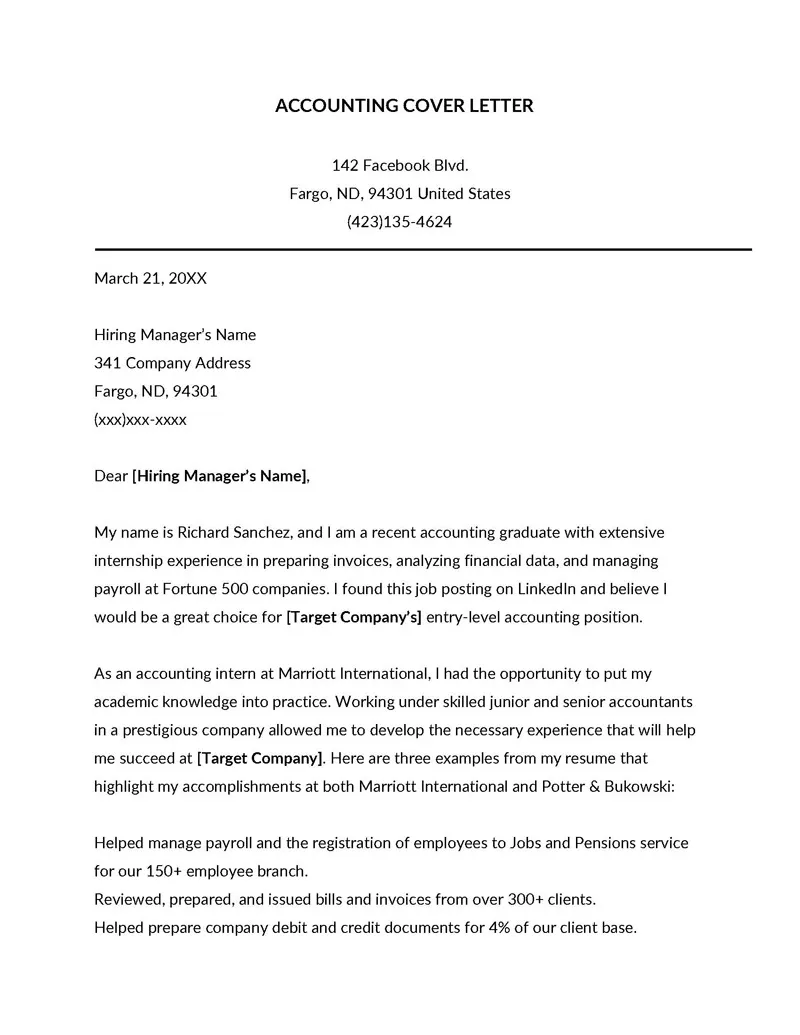What Is an Accounting Job Cover Letter
An accounting job cover letter is a crucial document that accompanies your resume when applying for accounting positions. It serves as an introduction, allowing you to highlight your skills, experience, and qualifications in a way that a resume alone cannot. Think of it as your personal sales pitch, designed to persuade a potential employer to consider your application seriously. It’s your first chance to make a positive impression and demonstrate why you’re the ideal candidate for the role. A well-crafted cover letter can significantly increase your chances of landing an interview, while a poorly written one can lead to your application being overlooked. This is where you get to show your personality and enthusiasm, which can be hard to convey on a resume.
Why Is an Accounting Job Cover Letter Important
The importance of an accounting job cover letter cannot be overstated. It provides context to your resume, explaining why your skills and experience align with the specific requirements of the job. It allows you to elaborate on your accomplishments, providing concrete examples of how you’ve excelled in previous roles. A cover letter gives you the opportunity to address any potential gaps in your resume, such as career changes or periods of unemployment, offering explanations that can ease an employer’s concerns. It also demonstrates your communication skills and attention to detail, both critical for success in accounting. In essence, the cover letter is a key element in demonstrating your suitability for the role, helping you stand out from other applicants.
Top Tip 1 Tailor Your Letter
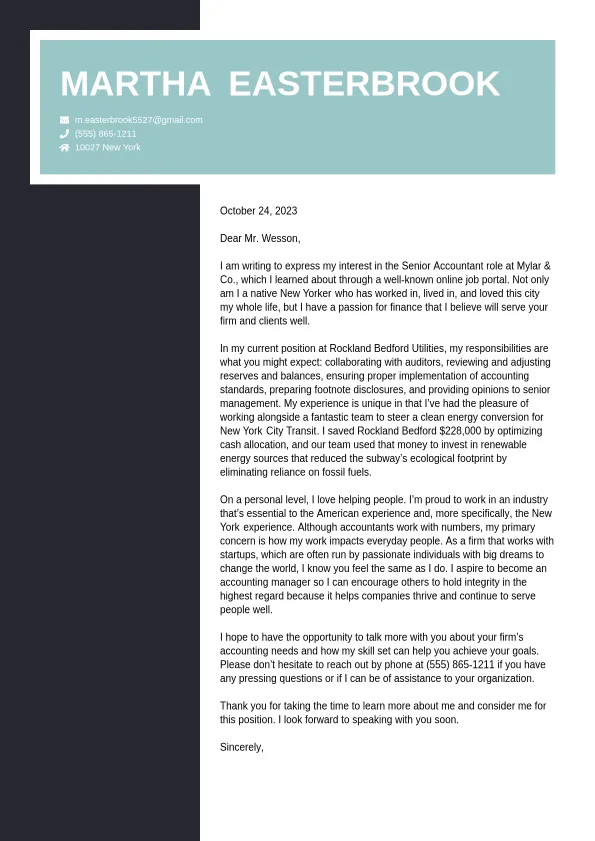
Generic cover letters rarely impress hiring managers. Customizing your cover letter for each accounting job application is a fundamental step towards success. This involves carefully reviewing the job description and identifying the key skills, qualifications, and experiences the employer is seeking. Then, highlight how your qualifications align with their requirements. Use the language of the job posting to reflect the values of the company and create a sense of understanding between you and the hiring manager. This demonstrates that you’ve taken the time to understand the role and the company. It helps you quickly show the hiring manager that you are a great candidate. Tailoring shows genuine interest and increases the chances of getting an interview.
Highlight Relevant Skills
In your cover letter, explicitly mention the skills that are most relevant to the accounting position. Refer back to the job description and identify the skills specifically requested, such as proficiency in accounting software (e.g., QuickBooks, SAP), knowledge of GAAP, experience with financial reporting, or expertise in tax preparation. Provide brief examples of how you’ve used these skills in past roles and what you achieved. When highlighting your skills, quantify your achievements whenever possible to strengthen your claims and show value. For example, instead of saying ‘Managed accounts payable,’ state ‘Managed accounts payable for a company with over $10 million in annual revenue, reducing processing time by 15%.’
Quantify Your Achievements
Quantifying your accomplishments is a powerful way to showcase your value to a potential employer. Use numbers and metrics to demonstrate your impact in previous accounting roles. Instead of simply stating that you ‘improved efficiency,’ provide details like ‘Streamlined the month-end closing process, reducing the time required by 20%.’ Or, instead of saying you ‘managed budgets,’ you might say ‘Managed budgets totaling $5 million, consistently coming in under budget by an average of 3%.’ Quantifiable results leave a lasting impression and help employers understand the tangible benefits you can bring to their organization. Including numbers reinforces your claims and provides concrete proof of your success.
Top Tip 2 Showcase Your Skills
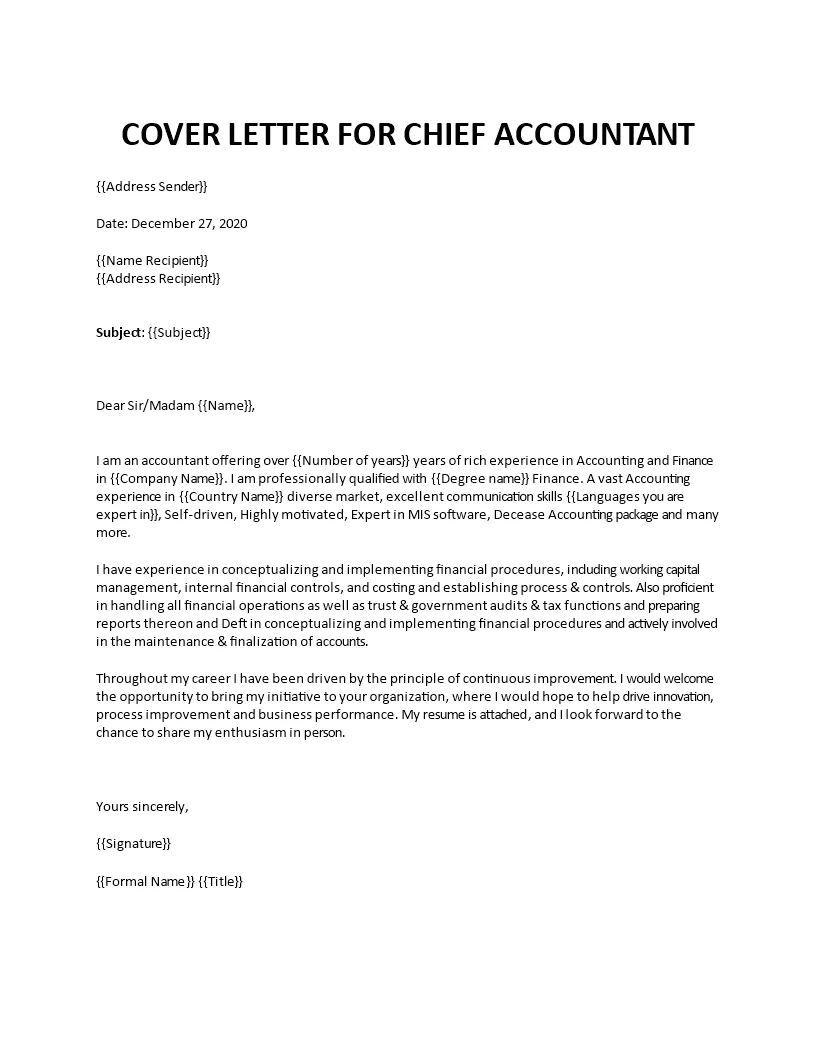
A great accounting job cover letter showcases a blend of technical and soft skills, highlighting your abilities to excel in the role. This should align with the job description to highlight the best fit between the open position and your skills. Make sure to provide clear examples to back up each skill that you list. Use the language that the hiring manager and employer use. This demonstrates that you’re not only qualified but also a strong fit for the company culture. Your cover letter can be the first chance to show that you have more to offer than just the experience written in the resume.
Technical Skills
Technical skills are the backbone of any successful accounting professional. In your cover letter, emphasize your proficiency in relevant software, such as QuickBooks, SAP, Oracle, or Microsoft Excel. Highlight your knowledge of accounting principles (GAAP or IFRS), financial reporting, budgeting, and auditing. Mention any certifications you hold, such as CPA (Certified Public Accountant) or CMA (Certified Management Accountant), as these demonstrate your commitment to the profession. Furthermore, include any experience with tax preparation, payroll processing, or other specialized accounting functions. Remember to tailor your list to match the requirements of the job you are applying for, ensuring relevance to the position.
Soft Skills
Soft skills are crucial for success in accounting, and your cover letter provides an excellent opportunity to showcase them. Highlight your communication skills by explaining your ability to explain complex financial information clearly and concisely, both in writing and verbally. Demonstrate your problem-solving abilities by providing examples of how you’ve resolved accounting challenges. Emphasize your attention to detail by describing how you’ve ensured accuracy in financial reporting. Mention your ability to work collaboratively in a team and your organizational skills, including time management and the ability to handle multiple tasks. These soft skills demonstrate your ability to be successful in a professional accounting role.
Top Tip 3 Follow a Clear Structure
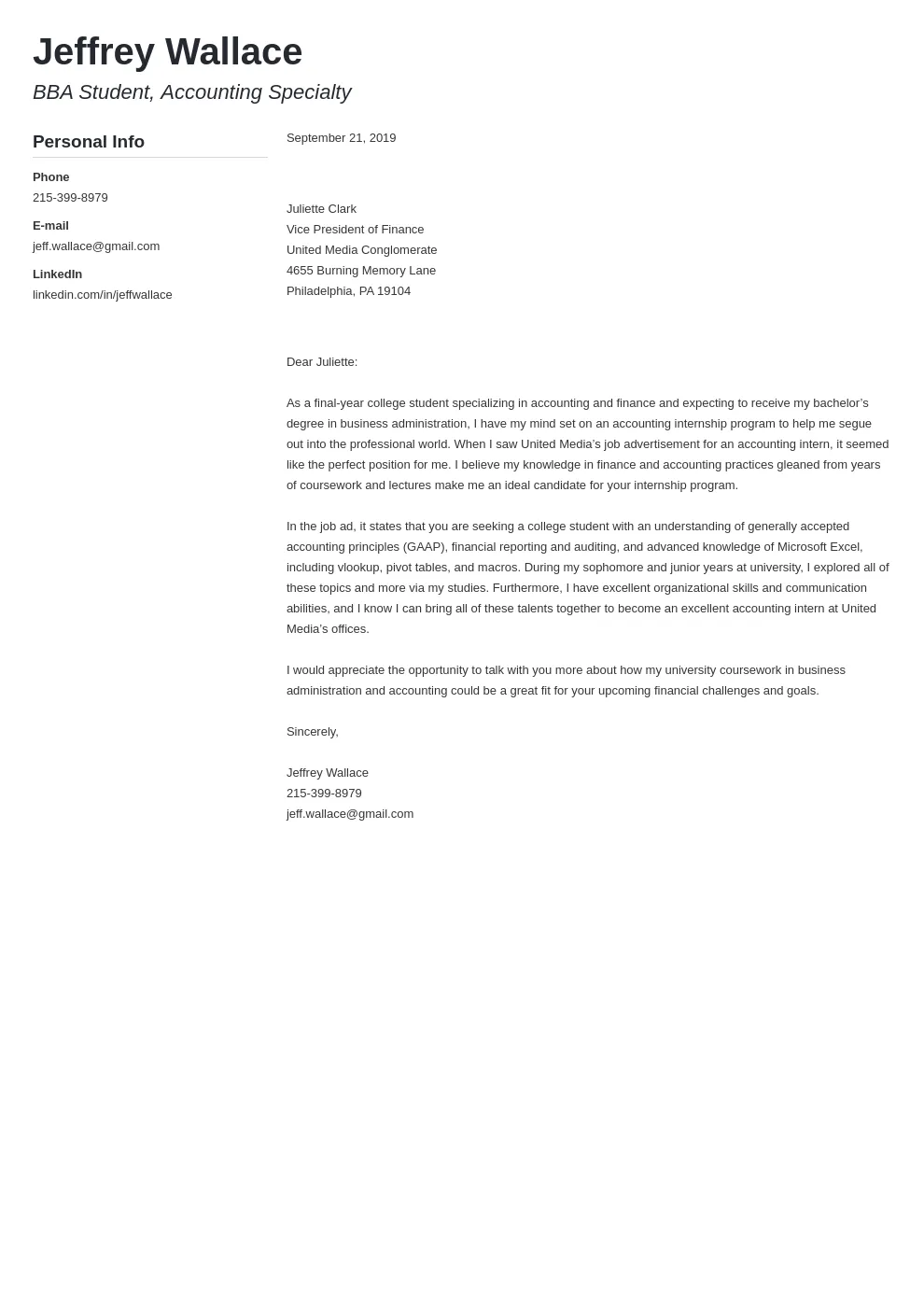
A well-structured cover letter is easy to read and conveys your message effectively. Structure your letter with a clear format. Proper formatting increases the readability and helps the recruiter understand your key points. Using clear headers and a logical flow makes a positive impression on the hiring manager. Adhering to a standard structure helps ensure that you include all the necessary information in a way that is easy to understand.
Opening Paragraph
Your opening paragraph should immediately grab the reader’s attention. Start by stating the position you are applying for and how you found the job posting. Then, briefly summarize your key qualifications and express your enthusiasm for the role and the company. Make sure to get the hiring manager’s attention early in your cover letter. Try to create a compelling opening that quickly shows how well you meet the needs of the position. This is your opportunity to make a great first impression.
Body Paragraphs
The body paragraphs should expand on your qualifications, providing specific examples of your skills and experience. Highlight your most relevant achievements and explain how they align with the job requirements. Quantify your achievements whenever possible. Provide concise explanations of your capabilities. Use clear and concise language and avoid jargon. Keep each paragraph focused on a specific point and provide supporting details to strengthen your claims.
Closing Paragraph
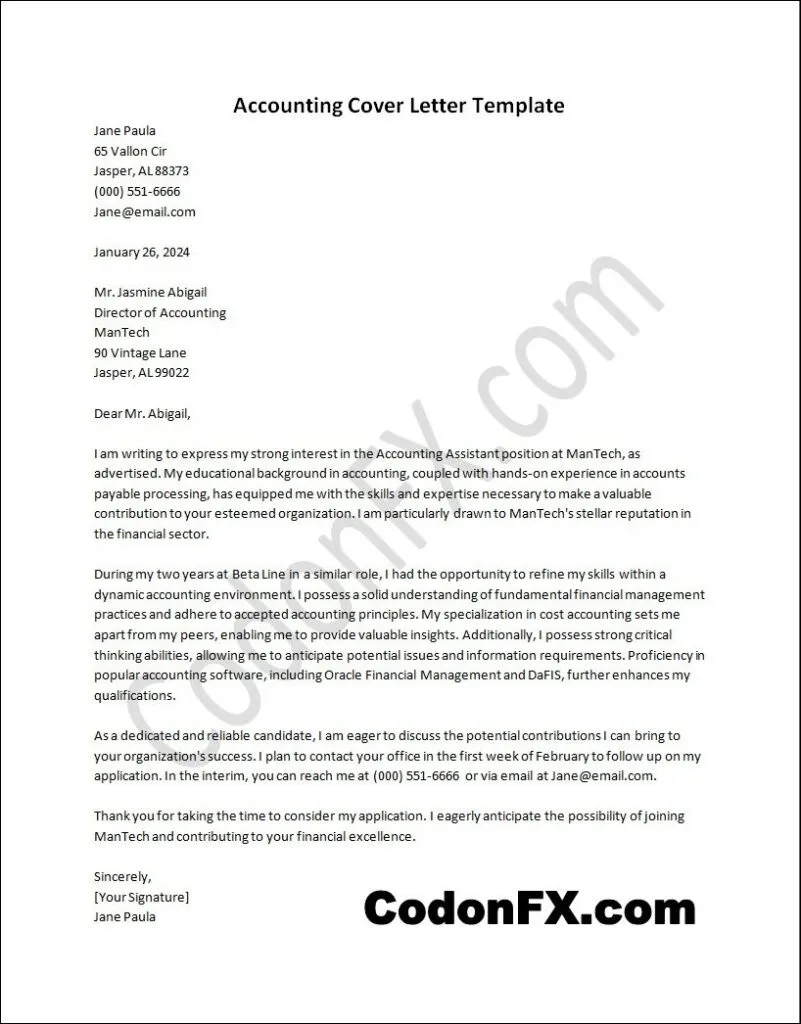
Your closing paragraph should reiterate your interest in the position and thank the reader for their time and consideration. Express your eagerness for an interview. Reiterate your contact information to make it easy for the hiring manager to reach you. End with a professional closing, such as ‘Sincerely’ or ‘Best regards.’ Make sure your closing is professional, warm, and reinforces your enthusiasm for the opportunity and shows professionalism.
Top Tip 4 Proofread and Edit Carefully
Errors in your cover letter can damage your credibility, so it’s essential to proofread and edit carefully. Even minor mistakes can make a negative impression. Attention to detail is crucial in accounting, and a cover letter filled with errors suggests a lack of care. Always set aside time to check for errors. You can also ask a friend or colleague to read your cover letter and give you feedback. This will help you get the most polished cover letter.
Check for Grammar and Spelling
Thoroughly check your cover letter for grammatical errors and spelling mistakes. Use spell-check and grammar-check tools, but don’t rely on them completely. Read your letter aloud to catch awkward phrasing and ensure it flows smoothly. Ensure your sentences are clear and easy to follow. Pay close attention to punctuation, as incorrect usage can change the meaning of your sentences. Make sure all dates, names, and titles are correct. A clean and error-free cover letter demonstrates your professionalism and attention to detail.
Ensure a Professional Tone
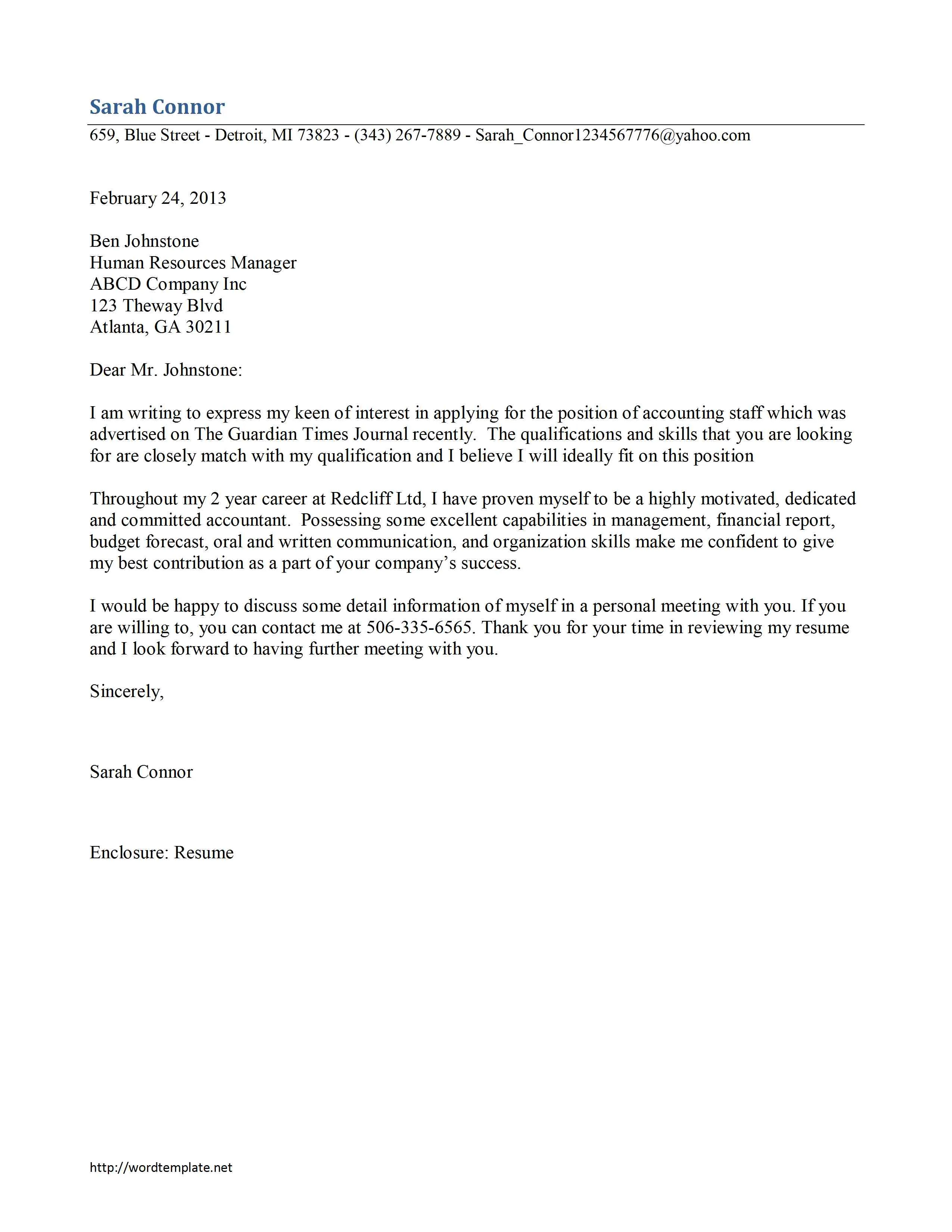
Maintain a professional tone throughout your cover letter. Use formal language and avoid slang, contractions, and casual expressions. Be polite and respectful in your wording. Write in a positive and confident tone, but avoid being overly boastful. Ensure your language is clear, concise, and easy to understand. Avoid using clichés or generic phrases. Present yourself as a knowledgeable and capable professional who is eager to contribute to the company’s success. A professional tone reflects your understanding of workplace communication and increases your chances of making a positive impression.
Top Tip 5 Customize for Each Application
Customizing your cover letter for each accounting job is essential. It shows your interest and attention to detail. Generic cover letters are easy to spot and may lead to your application being quickly dismissed. Tailor your letter to reflect the specific requirements of each job. Research the company and hiring manager. Use the job description to highlight the skills and experiences most relevant to the role. This ensures your application resonates with the employer and demonstrates your genuine interest.
Research the Company
Before submitting your cover letter, research the company and understand its mission, values, and recent achievements. Visit the company’s website, read news articles, and check social media to learn more about its culture and operations. This research will help you tailor your cover letter to the company. Mention specific projects, initiatives, or values that resonate with you. Showing this knowledge helps you express your understanding of the company and demonstrates your commitment to the position. Tailor your letter to each company you apply to.
Address the Hiring Manager
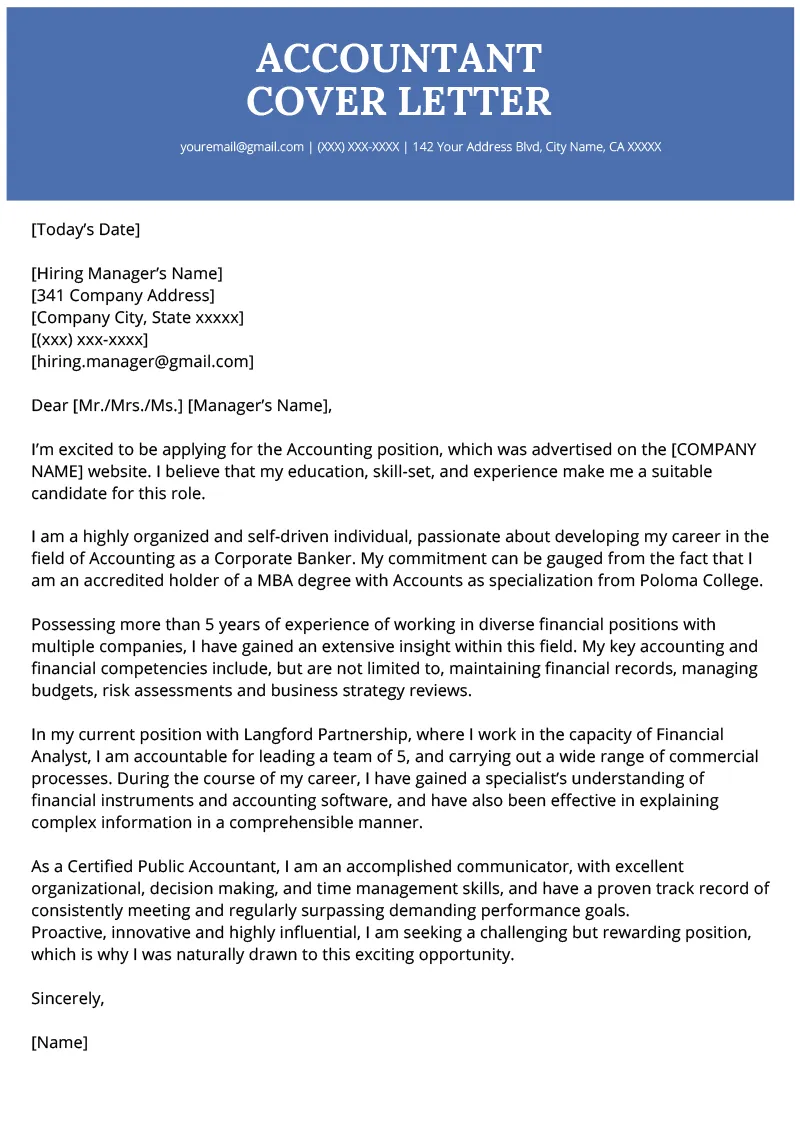
Whenever possible, address your cover letter to the hiring manager by name. This shows you’ve taken the time to research the company and are making a personal connection. If you cannot find the hiring manager’s name, use a professional greeting, such as ‘Dear Hiring Manager.’ Avoid generic greetings like ‘To Whom It May Concern.’ Researching the hiring manager also allows you to tailor your letter with their specific interests and preferences in mind. A personal greeting demonstrates your commitment to the company and enhances your chances of making a positive impression.
